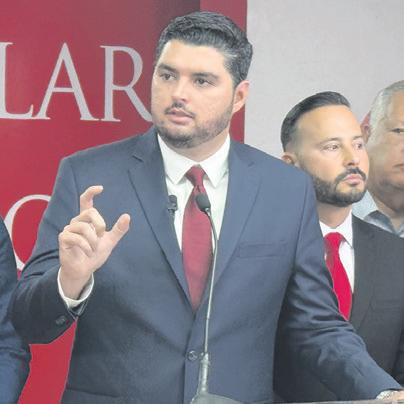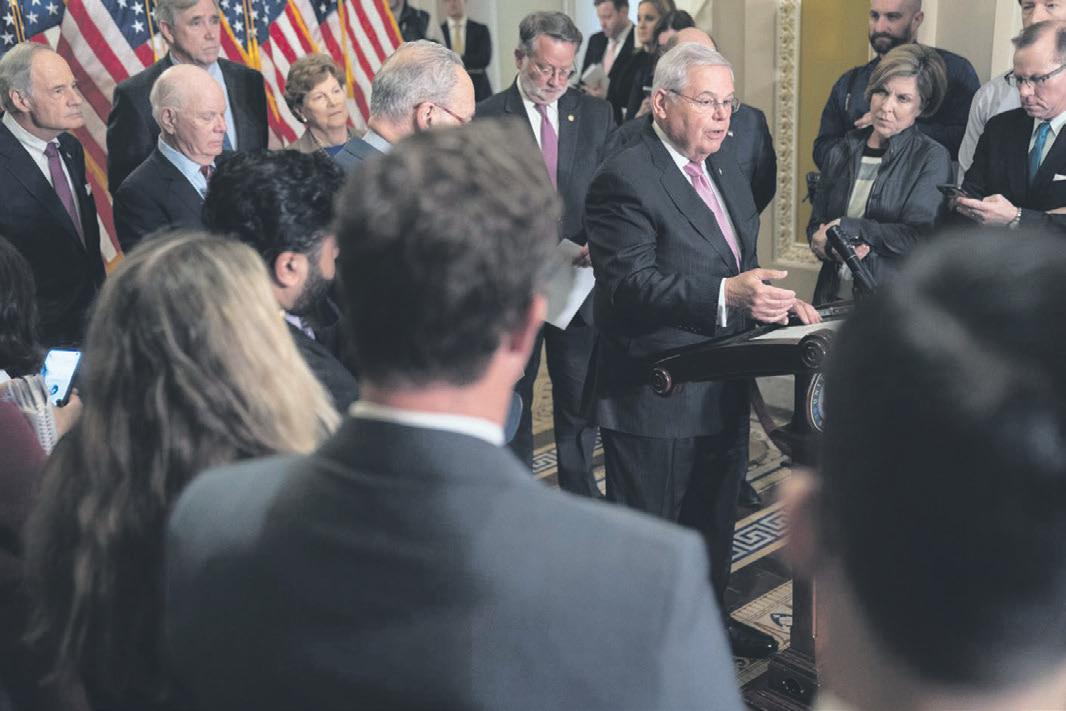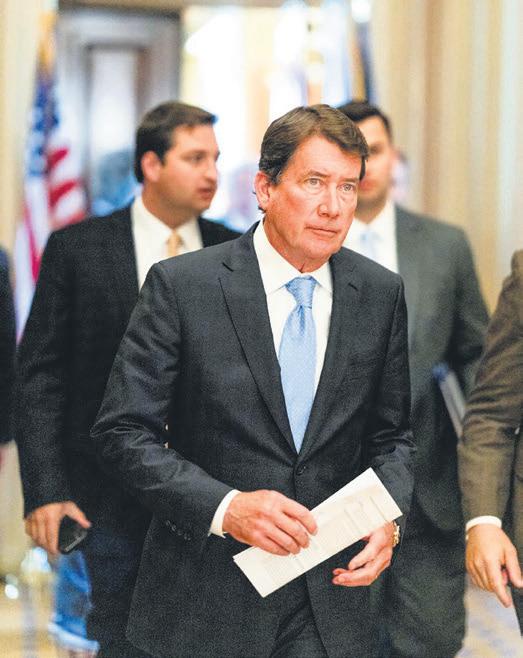

Stabilizing Supply






Arash Khamooshi/The New York Times

GOOD MORNING

PDP secretary general: Commonwealth has power to protect immigrants’ rights





By JOHN McPHAUL jpmcphaul1@gmail.com
Popular Democratic Party (PDP) Secretary General Manuel Calderón Cerame insists that the Commonwealth of Puerto Rico has the authority and the power to protect immigrants from deportation despite the aggressive actions of the federal government to round up and deport individuals with undefined immigration status, mostly Dominicans, from the island.
“We have the power to take cases to court and also to educate immigrants that for instance ICE [U.S. Immigration and Customs Enforcement] can’t enter houses without a warrant sworn out before a judge in court,” Calderón Cerame said.
He noted the dedication of the “populares” to protect the rights of immigrants, pointing out that the right to have a driver’s license was passed under the administration of PDP governor Alejandro Garcia Padilla (2013-2017).
“Puerto Rico has a tradition to defend the democratic values and defend what is just,” he said.
“Not only the president [of the party] and resident commissioner [Pablo José Hernández Rivera] but the minority whips of both the House and the Senate [Rep. Héctor Ferrer Santiago and Sen. Luis Javier Hernández Ortiz, respectively] have been protecting the rights that exist for immigrants that demand that the order for removal comes from a competent federal court,” Calderón Cerame said. “The jurisdiction of the states and the territories permits the local government to protect everyone’s rights in accord with due process.”
But what do you do with a federal government that doesn’t seem inclined to fully obey due process?
“Puerto Rico has a tradition to defend the democratic values
By THE STAR STAFF
Supreme Court Chief Justice Maite Oronoz Rodríguez announced on Wednesday the renewal of collaborative agreements for the Specialized Courtroom Program for Domestic and Gender-Based Violence Cases in the judicial regions of Ponce and Utuado.
“The Judiciary and all of us here today have an unwavering commitment to urgently address the rampant wave of gender-based violence to which our women and girls are exposed daily,” Oronoz Rodríguez said during the signing.
The specialized courtrooms provide judicial and interdisciplinary care with trained judges and staff, separate areas for each party, and children’s rooms that minimize the emotional impact on minors present during the proceedings.
In Ponce, the Madre Dominga Casa Belén Center and the Special Institute for the Integral Development of the

and defend what is just,” the PDP official said, referring again to the passage in the island Legislature of the law that permitted immigrants to have driver’s licenses.
Calderón Cerame said Puerto Rico doesn’t only have historical ties with the Dominican Republic but also with Cubans, Venezuelans, Jamaicans, Panamanians and Costa Ricans who take jobs that Puerto Ricans aren’t disposed to do, such as brick laying and other construction jobs. There is a lack of work manpower, he said, and it is the duty of the Puerto Rican government to protect those people.
So how does the PDP secretary general propose to physically protect immigrants against ICE officials who demonstrate aggressive tactics of the kind that can be seen on the nightly news in Puerto Rico?
He reiterated that the commonwealth has instruments to guarantee the rights of immigrants.
“And as far as public policy goes, we must make sure that this government policy is not a Trumpista policy,” Calderón Cerame said
Individual, Family, and Community are joining for the first time, along with the Julia de Burgos Protected Home, the Sor Isolina Ferré Centers, and Ponce Medical School. The municipalities of Guánica, Juana Díaz, Peñuelas, Ponce, Villalba and Yauco also provide support.
In Utuado, the municipality of Adjuntas collaborates, followed by Utuado, Lares and Jayuya. Also participating are the Puerto Rico Health and Justice Center, Hogar Ruth, Castañer General Hospital, the Dominican Women’s Center, and the Family and Health departments.
Both centers are supported by the Department of Justice, the Office of the Women’s Advocate, Pontifical Catholic University of Puerto Rico, the Peace for Women Coordinator, the Wings for Women Foundation and Legal Services of Puerto Rico.
The Ponce and Utuado courtrooms are part of a broader program operating in several judicial regions across the island.
Popular Democratic Party Secretary General Manuel Calderón Cerame
By THE STAR STAFF
The Puerto Rican legal community is undergoing a significant transformation, as the Supreme Court has approved a new set of ethical guidelines for the island’s practicing lawyers and notary publics.
Known as the Rules of Professional Conduct, the regulations are designed to ensure that Puerto Rico’s legal professionals maintain the highest standards of integrity, competence and responsibility.
Ramón Rosario Cortés, president of the Bar Association of Puerto Rico, emphasized the importance of the update in reflecting the current state of the profession: “The new rules reflect the times we live in and require
us to live up to the highest ethical principles.”
One of the most significant developments is the incorporation of a rule on technological competence and due diligence. This rule addresses the ethical use of cutting-edge tools, such as artificial intelligence, in the legal profession. Additionally, specific provisions for notary publics are now integrated into a single body of legislation for the first time. The updated rules also establish the ethical duty of members of the public ministry and introduce new guidelines on promoting legal services.
The Bar Association has committed to supporting the transition to the new regulatory framework through orientation and educational processes. Rosario promised that “in the coming weeks, we will announce a
comprehensive, free course on these changes.”
The Rules of Professional Conduct will take effect on Jan. 1, 2026, replacing the Code of Professional Ethics that has been in force since 1970. As the oldest professional association in Puerto Rico and one of the oldest bar associations in the world, the Bar Association of Puerto Rico is dedicated to protecting the public and upholding the standards of the legal profession.
With more than 3,000 lawyers, the Bar Association of Puerto Rico is a cornerstone of the island’s legal community. As the changes take effect, Puerto Rico’s legal professionals will continue to provide essential services while adapting to an evolving landscape and promoting ethical practices.
PR’s legal landscape evolves as high court approves updated rules of professional conduct Dept. of State contractor wasn’t cleared to do business locally
By THE STAR STAFF
The Puerto Rico Comptroller’s Office (PRCO) announced on Wednesday that the Department of State had contracted with a foreign corporation that was not authorized to conduct business in Puerto Rico.
The finding emerged from an audit that revealed that from Dec. 28, 2018, to June 30, 2019, the corporation was responsible for processing licenses and administering examinations for 16 examining boards associated with the department. The contract lacked a legal requirement for the corporation to inform the department of any changes related to its name, business status, or mergers during the contract period, which violated Law 164-2009, the General Corporation Law.
On Dec. 31, 2018, just three days later, the contracted
corporation merged with another foreign corporation and continued providing the agreed-upon services until Dec. 16, 2020.
The finding indicates that the Department of State failed to ensure compliance with Puerto Rico’s tax, labor, and commercial laws. Moreover, the foreign corporation that took over all operations went 716 days without a Certificate of Authorization to conduct business in Puerto Rico.
The audit revealed five key findings. One major issue was that the Department of State did not obtain a Certification of Justification from the Office of Management and Budget, which would exempt the professional services corporation from being contracted through an open and competitive process — a requirement for contracts exceeding $250,000.
Additionally, an examination of 11 monthly revenue reports submitted by the companies responsible for adminis-

tering the professional bar exams showed that those reports had not been approved by the assistant secretary of records and examining boards. Approval of the monthly report is necessary before sending it to the Finance Division to avoid errors or irregularities in the distribution of funds.
In the case of passport application transactions, auditors were unable to identify official payment receipts for 79% of transactions conducted from Jan. 3 to April 11, 2022, at the Plaza Las Américas and Arecibo offices. Moreover, they found official receipts for $18,900 that were issued up to 11 days after the transactions occurred, as well as receipts for minor applicants whose names were not included in the Passport Application Transmittal document sent to the federal government.
The identified issues compromise proper control over the collection process and may lead to irregularities.
PR gov’t boosts DC presence to advance coordinated federal agenda
By THE STAR STAFF
The Puerto Rico Federal Affairs Administration (PRFAA) announced Wednesday that, as part of Gov. Jenniffer González Colón’s strategy, high-level meetings and negotiations were held in the U.S. capital to promote project execution and the island’s economic development.
“PRFAA continues to implement a firm, coordinated, and results-focused strategy,” PRFAA Executive Director Gabriella Boffelli said in a written statement. “These visits demonstrate our administration’s commitment to eliminating bureaucracy, establishing lasting partnerships, and ensuring that every federal dollar approved for Puerto Rico translates into action. Today more than ever, we reaffirm our mission to serve as a link between
Puerto Rico and the federal government, with a clear and firm vision.”
Among the agency heads who participated in the meetings, which were arranged with members of Congress and federal agencies, were Health Secretary Víctor Ramos Otero, Public Safety Secretary Arthur Garffer, and Economic Development Bank Director Carmen Vega Fournier.
The governor said she will continue to lead an aggressive agenda to streamline processes and ensure the use of federal funds for the benefit of the people.
“We cannot allow federal funds to remain stagnant due to bureaucratic obstacles,” González Colón said.
During the same week, Rep. Mike Collins (R-Ga.), chairman of the House Subcommittee on Water Resources and the Environment, visited Puerto Rico and met with
local officials as part of strengthening collaboration on federally funded projects.

Ramón Rosario Cortés, president of the Puerto Rico Bar Association (Facebook via Ramón Rosario Cortés)
Gabriella Boffelli, executive director of the Puerto Rico Federal Affairs Administration
Governor marks arrival of US-flagged natural gas ship
By THE STAR STAFF
Gov. Jenniffer González Colón celebrated on Wednesday the arrival of American Energy, the first U.S.-flagged natural gas carrier.
“This is the first U.S. flag to serve natural gas to Puerto Rico,” the governor said. “We did not have one. Congress had a bill banning the transport of natural gas to Puerto Rico, which we helped amend.”
González Colón said she did not want to depend on foreign ships to bring such a critical product. For the first time, there is a maritime route to bring natural gas to the island, she said.
Crowley commenced operations of the first domestic liquified natural gas (LNG) carrier to transport U.S.-sourced natural gas to Puerto Rico. The milestone will provide Puerto Rico with increased access to the reliable supply of U.S.-produced LNG, helping address the island’s ongoing power demands.
Crowley and Naturgy entered into a multi-year agreement that provides for the regular delivery of the U.S. mainland-sourced LNG to Naturgy’s operating facility in Peñuelas.
The Crowley-owned carrier American Energy, which has capacity of 130,400

marine Isla Grande cargo terminal in San Juan for its container and roll-on/roll-off vessels, including two LNG-fueled ships, and logistics services. Crowley annually delivers more than 94 million gallons of LNG through its LNG Loading Terminal in Peñuelas as well as provides ocean delivery and land transportation using ISO (International Organization for Standardization) tank containers.
At capacity, each delivery of LNG aboard American Energy, which departed from Port Sabine on the Gulf Coast of Texas late last week, provides enough energy to power 80,000 homes for a year. LNG is also a lower-carbon fuel emitting less greenhouse gas emissions compared to diesel and other traditional energy sources.
cubic meters (34.4 million gallons) per voyage, will operate in accordance with the U.S. Coast Guard Authorization Act of 1996. The vessel has a CAP 1 rating, certifying its top rating for safety and vessel condition, and its compliance with all regulatory requirements.
“The entry into service of American Energy marks a significant step for fuel supply reliability in Puerto Rico for our energy grid, which will greatly benefit our people,” the governor said.
The partnership is an initiative using existing regulations to increase access to a U.S.-based LNG source that expands the island’s options “for the stabilization of our energy grid, as we work toward providing our residents and businesses a more consistently reliable power generation source,” González Colón added.
The 900-foot-long (274 meters) LNG carrier builds on Crowley’s 70-plusyears commitment to Puerto Rico. The company also operates the full-service
“We are proud and privileged to expand U.S. LNG availability in Puerto Rico in partnership with Naturgy,” said Tom Crowley, chairman and CEO of Crowley Corp. “LNG is an ample, reliable energy source available in the U.S. that provides a more resilient and lower-emission option as part of our nation’s energy portfolio for quickly serving the growing power needs of Puerto Rico while supporting American jobs, American energy production and U.S. national security.”
Agricultural sector weighs in on projects proposed for island’s southwest
By THE STAR STAFF
Representatives of the agricultural sector of the Mayagüez-Aguadilla District spoke before the Puerto Rico Senate on Wednesday, meeting in a Special Committee of the Whole in the municipality of San Germán, where they highlighted, among other things, their positions on projects proposed for the Lajas Valley.
Agronomist Sol Rosado Arroyo, who spoke on behalf of several organizations such as RiceTec Puerto Rico, the Agronomists Association, the Lajas Valley Agricultural Coalition, the Agricultural Industry Association and the Puerto Rico Farmers Association, maintained that the valley is a strategic asset for Puerto Rico, and that companies with a global footprint like RiceTec, along with its farmers, are fundamental to its vitality.
“The future of our productive capacity depends on your leadership,” Rosado said. “We urge this Honorable Committee and the entire
Senate to prioritize and allocate the necessary resources for the maintenance and modernization of our irrigation and drainage systems, supporting the work of Engineer Santiago and his team with the necessary resources. We also want to ensure that any environmental project, such as the restoration of the Guánica Lagoon, undergoes a rigorous analysis of its agricultural impact, and that solutions are developed to protect our production and our farmers.”
Rosado emphasized that investing in the Lajas Valley is not an expense, but rather is a crucial investment in food self-sufficiency, economic resilience and the well-being of Puerto Rico.
Meanwhile, in his presentation before the committee, Luis R. Pérez-Alegría, retired professor at the University of Puerto Rico Mayagüez Campus, highlighted the success of the irrigation and drainage project in southwest Puerto Rico, which has been in operation for more than 70 years.
The system, based exclusively on the force
of gravity, transfers water from the relatively moist, higher-elevation areas of the island’s center to the southwest, benefiting both agriculture and the drinking water supply. It also generates 29,000 kilowatts of energy annually for the island’s electrical grid.
Pérez-Alegría also noted that the Lajas Valley, due to its low annual rainfall and high evaporation, has a natural water deficit, which historically made the Guánica lagoon a seasonal, rather than permanent, body of water.
The retired professor warned that “the proposal to restore the Guánica lagoon could reverse the achievements of the southwest irrigation system by causing saturation and salinization of agricultural soils.”
“Due to the flat topography of the Lajas Valley, the drainage canal was strategically located at its lowest point to eliminate excess water and salts. Restoring a permanent lagoon in that area would interfere with this critical function,” Pérez-Alegría said. “According to simulations presented, the restoration could
flood up to 2,000 cuerdas [1,942 acres] of agricultural land, reducing the country’s agricultural frontier and increasing flood risks.”

It was emphasized by representatives of the agricultural sector that investing in the Lajas Valley is not an expense, but rather is a crucial investment in food self-sufficiency, economic resilience and the well-being of Puerto Rico.
The crew of the liquified natural gas (LNG) tanker ship American Energy in Peñuelas on Wednesday. Crowley commenced operations of the first domestic LNG carrier to transport U.S.-sourced natural gas to Puerto Rico -- a milestone that will provide the island with increased access to the reliable supply of U.S.-produced LNG, helping address ongoing power demands. (Facebook via Jenniffer González Colón)
Thursday, June 19, 2025 6
Obama, back in public eye, offers a careful warning of a Democratic slide
By LISA LERER
Former President Barack Obama warned on Tuesday night that the country was “dangerously close” to allowing its government officials to act in a way “consistent with autocracies,” offering a veiled rebuke of the Trump administration that was delivered with trademark caution.
Appearing before a civic group in Hartford, Connecticut, during a tumultuous stretch for the country both at home and abroad, Obama offered a winding explanation about the dangers facing American democracy. He pointed to an erosion of traditional values like the rule of law, an independent judiciary, the freedom of the press and the right to protest.
“If you follow regularly what is said by those who are in charge of the federal government right now, there is a weak commitment to what we understood — and not just my generation, at least since World War II — our understanding of how a liberal democracy is supposed to work,” he said during a discussion with Heather Cox Richardson, a popular anti-Trump writer and historian.
Democracy, Obama said, requires government workers, judges and lawyers at the Justice Department to uphold the Constitution and follow the law.

“It requires them to take that oath seriously, and when that isn’t happening we start drifting into something that is not consistent with American democracy,” he said. “It is consistent with autocracies. It is consistent with Hungary under Orban.”
He went on: “We’re not there yet completely, but I think that we are dangerously close to normalizing behavior like that. And we need people both outside government and inside government saying, ‘Let’s not go over that cliff because it’s hard to recover.’”
Yet at a time when the country faces protests, political violence and the possibility of entering another foreign war, Obama kept his remarks to veiled critiques and professorial musings.
He made no mention of the growing speculation that President Donald Trump could order the United States to openly enter the escalating war between Israel and Iran by bombing a key Iranian nuclear facility. Nor did he bring up the unusual pressures and threats the Democratic Party has

been facing.
In recent days, a growing number of elected Democrats have been detained, and in some cases manhandled, by federal agents; a Democratic governor was threatened with arrest by Trump and with being “tarred and feathered” by the House speaker; and a Democratic state lawmaker in Minnesota and her husband were assassinated.
Instead, Obama encouraged others — particularly those at law firms, universities and businesses — to speak out against the demands of the Trump administration. Obama recognizes that he is unlikely to sway Republicans or Trump himself with any public critiques, so he has been focusing on issues where his words can have an effect, according to people who work with him. In April, he also called on universities and law firms to resist intimidation from the Trump administration.
On Tuesday evening, he offered a particularly stinging critique of affluent liberals before the audience in Connecticut, a wealthy Democratic state.
During his presidency, liberals felt “comfortable in their righteousness,” he said, because it wasn’t tested.
“You could be as progressive and socially conscious as you wanted and you did not have to pay a price,” he said. “You could still make a lot of money. You could still hang out in Aspen and Milan and travel and have a house in the Hamptons and still think of yourself as a progressive.” He added, “We now have a situation in which all of us are going to be tested in some way and we are going to have to decide what our commitments will be.”
“Now things are a little different,” he said. “You might
lose some of your donors if you’re a university and if you’re a law firm, your billings might drop a little bit, which means you cannot remodel that kitchen in your house in the Hamptons this summer.”
His comments were unlikely to satisfy Democratic officials and voters who have grumbled about his reluctance to wade into contemporary politics, wanting him to offer more vocal and frequent criticism of the Trump administration. But he has made clear that he does not intend to become a leader of the opposition. Audio and video recordings of his remarks Tuesday night were forbidden, hampering their widespread transmission.
While he opposes much of Trump’s agenda, Obama believes that offering a steady stream of criticism of the administration would dilute the power of his voice, according to people who work with him.
His remarks Tuesday, which wound through the use of the internet in his early campaigns to a brief history of globalization over the past half-century, amounted to a call to restore democracy by resuscitating core values of the past. Obama lamented the loss of common ground, trust and even basic facts. Woven into his comments was a critique of Trump and the Republican Party — though he never mentioned his successor by name.
“In 2020, one person won the election and it wasn’t the guy complaining about it,” he said. “That’s just a fact. Just like my inauguration had more people.” He added, “I don’t care, but facts are important.”
Obama added: “One of the most pernicious things that has happened is we have a situation now where we’re not just arguing policy or values or opinions, but basic facts are being contested, and that is a problem.”
Behind the scenes, Obama maintains an open door to Democratic elected officials. He frequently offers advice to congressional leaders, governors, members of Congress and potential candidates who contact him for advice. Next month, he will headline a fundraiser for the Democratic National Committee at the home of New Jersey Gov. Phil Murphy, according to three people briefed on the plans.
At a time when his party’s approval ratings are at historical lows, Obama remains the most popular living Democrat. Before his appearance Tuesday, attendees posed before a backdrop with signs reading “Yes we still can” and “Hartford still has hope.”
In private discussions, Obama has praised his party’s bench of leaders in statehouses and in Congress, saying a new generation must lead Democrats into the future.
He has compared this moment to early 2005, when he arrived in the Senate with Democrats out of power in Washington, according to a person briefed on the conversations. In the 2006 midterm elections, Democrats gained control of Congress. And two years after that, he became the country’s first Black president and reenergized the party.
The San Juan Daily Star
Former President Barack Obama moderates a conversation about hope and pluralism at the Obama Foundation 2024 Democracy Forum in Chicago, Dec. 5, 2024. Obama stepped gingerly into the public fray on Tuesday night, after weeks of quiet grumbling from some demoralized Democrats for what they say is his silence in the face of a frontal assault on liberal America by the Trump administration. (Jamie Kelter Davis/The New York Times)
A senator’s fall from grace ends in a grim federal lockup
By TRACEY TULLY
For decades, Bob Menendez had the ear of presidents and prime ministers. He controlled the flow of military aid as the Democratic leader of the Senate Foreign Relations Committee. A son of Cuban refugees, he was a go-to authority on immigration policy.
But Tuesday, just after 9 a.m., Menendez became a ward of the same government that he once helped to lead when he entered a federal prison in Pennsylvania to begin an 11-year sentence for political corruption.
He will be known as prisoner No. 67277-050 at Federal Correctional Institution Schuylkill in Minersville, roughly three hours away from the home he has shared in New Jersey with his wife, Nadine Menendez, who is expected to be sentenced in September for her role in the scheme. Federal agents found bribes ranging from kilo bars of gold, a Mercedes-Benz convertible and more than $480,000 in cash during a search of the couple’s modest split-level home in Englewood Cliffs.
A federal spokesperson confirmed that Menendez was in the custody of the U.S. Bureau of Prisons soon after a red car with New Jersey license plates was spotted entering and exiting the facility.
After a nine-week trial in New York City, Bob Menendez, a Democrat, became the only U.S. senator ever to be convicted of acting as an agent of a foreign government. Prosecutors have since called the crimes at the heart
of a complex, yearslong bribery conspiracy “stunningly venal” and the most serious “in the history of the republic,” as they argued for a sentence even stiffer than the one imposed.
Lawyers for Menendez, who is 71, have called it a death sentence.
“It is well-recognized that inmates with a degree of celebrity,” they wrote in a legal filing, “are at increased risk of attention, harassment and violence from their fellow inmates.”
The Schuylkill facility includes a medium-security, 980-person lockup that houses notorious criminals like James Coonan, the onetime head of a New York City gang known as the Westies, and Gurmeet Singh Dhinsa, a gas station magnate serving a life sentence for murder.
Menendez is expected to be assigned to an adjacent 225-person minimum-security camp in the complex, where prisoners sleep in dormitory-style rooms, often in bunk beds, according to two people familiar with his prison designation.
The two sites have several things in common, according to Brad Troup, who was convicted of distributing heroin that caused a death and served his final years of incarceration at Schuylkill’s medium-security prison.
Prisoners eat the same meals, can purchase identical items from the commissary and participate in a shared prison industry — electronics repair and recycling. At the camp, prisoners are taught to fix broken electronics, like computers and electrocardiogram ma-

chines. Items that are deemed beyond repair go to the medium-security prison, where they are dismantled, and the metals are separated to be sold for scrap, Troup said.
Books can be sent to detainees through approved vendors, and visiting privileges can be adjusted based on behavior.
The population of Schuylkill is about 60% Black, 21% Hispanic and 18% white, according to a recent federal report. And during meals and in the yard, it is highly segregated by race, according to Troup, 47.
Before his trial began last spring, when Menendez decided against running for reelection to the Senate as a Democrat, he released a nine-minute video chronicling what he saw as his most meaningful congressional contributions. And few people familiar with the long arc of his career in New Jersey would dispute that Menendez was once among the most influential politicians in Congress.
He worked relentlessly to provide federal assistance to residents devastated by Superstorm Sandy in 2012 and helped to write the legislation to expand health care coverage that became known as Obamacare.
“This is a sad and humbling day,” said Michael Soliman, Menendez’s longtime political adviser who ran his campaigns. “But the jury verdict does not erase Sen. Menendez’s profound and long-standing positive contributions in so many areas affecting New Jersey and the country.
“Those, too, will be a part of his earned legacy.”
Menendez had served as the mayor of Union City, New Jersey, where he was raised, and its representative in the state House before being elected to the U.S. House. He became the first Latino to represent New Jersey in the Senate after being selected for the position in 2005 by Jon S. Corzine, who vacated the seat early to take over as New Jersey governor.
Almost immediately, the federal prosecutors’ office in New Jersey, led at the time by Chris Christie, a Republican, began an inquiry into Menendez tied to rental income on a building he owned. That investigation was closed with no charges filed, and Menendez went on to beat Thomas Kean Jr. — now a U.S. representative — to win a six-year term.
Menendez and his Democratic allies maintained that the inquiry had been motivated by nothing other than politics, but about nine years later, after an unrelated investigation, he would be charged for the first time with taking bribes. A trial in New Jersey ended with a hung jury in November 2017, and prosecutors later
dropped the case.
The bribery scheme that put him in prison Tuesday began only a few months later.
Prosecutors with the U.S. attorney’s office for the Southern District of New York spent weeks laying out an audacious , yearslong plot involving a halal meat certification company and the governments of Egypt and Qatar. A jury convicted Menendez of acting as an agent of Egypt, including ghostwriting a letter for Egyptian officials to influence his Senate colleagues and steering arms to the country. He was also found guilty of trying to quash state and federal criminal prosecutions on behalf of New Jersey allies.
“You stood at the apex of our political system,” the trial judge, Sidney H. Stein, said before sentencing Menendez to 11 years.
“Somewhere along the way, I’m sorry to say, you became a corrupt politician, helping to feed the unfortunate cynicism of many people,” he added.
It was the longest sentence ever issued to a U.S. senator. Only five of the 13 senators to be charged with crimes since 1807 were convicted, according to court filings. Until Menendez’s case, the longest sentence imposed had been three years — a penalty issued to Sen. Harrison Williams Jr., also of New Jersey, for his role in a bribery conspiracy that became known as Abscam.
Last week, a federal appeals panel voted 2-1 to reject Menendez’s request to delay the start of his sentence, pending the outcome of his appeal.
That same day, Menendez took to social media to again plead his case to an audience of one: President Donald Trump, who has granted a flurry of pardons to political allies during the first five months of his second term.
Menendez, in posts on social platform X, has mimicked many of the president’s complaints about a “weaponized” Justice Department. In some, he has tagged Trump. In others, he refers to the president as “DJT.”
“President Trump is right,” Menendez wrote, minutes after he was sentenced. “This process is political and has been corrupted to the core. I hope President Trump cleans up the cesspool and restores integrity to the system.”
Such lobbying efforts have paid off for others, including Mayor Eric Adams of New York, a Democrat, whose indictment on corruption charges was dropped by federal prosecutors. The Justice Department has made clear that some of the offenses for which Menendez was convicted are no longer even a priority.
Then-Sen. Robert Menendez (D-N.J.) speaks to reporters at the Capitol in Washington on May 3, 2023. Menendez was once among the Senate’s most powerful members. (Sarah Silbiger/The New York Times)
US Senate passes cryptocurrency bill, handing industry a victory
By ROBERT JIMISON
The Senate earlier this week passed legislation to establish a regulatory framework for stablecoins, putting the cryptocurrency industry, which had long been viewed with suspicion by lawmakers in Washington, on the brink of a major policy breakthrough.
Bipartisan approval of the bill, known as the GENIUS Act, followed an aggressive lobbying campaign aimed at transforming the cryptocurrency industry’s image from scandal-plagued experiment to legitimate financial sector.
Senate passage came over the fierce objections of many Democrats, who warned that the measure lacked strict-enough regulations or oversight to prevent abuses, including anticorruption rules that would bar President Donald Trump and his family from continuing to profit from cryptocurrency.
The bill still must be passed by the House and signed by the president. But the 68-30 vote in the Senate marked the first time the chamber has approved major cryptocurrency legislation. It represented a significant step toward giving the industry what it has long sought from Washington: the credibility that comes with federal oversight.
Stablecoins, a type of digital currency tied to the value of the U.S. dollar, are often seen as comparatively reliable types of cryptocurrency. These cryptocurrencies are designed to avoid the wild fluctuations in value of some popular coins like bitcoin, making them something of a bridge to the world of traditional currency.
Sen. Bill Hagerty, R-Tenn., the bill’s lead sponsor, said the legislation would be a significant step toward breaking down the barriers between traditional financial markets and

Sen. Bill Hagerty (R-Tenn.) leaves a meeting with tech CEOs at the U.S. Capitol in Washington, June 18, 2024. The Senate on Tuesday, June 17, 2025, passed legislation to establish a regulatory framework for stablecoins, putting the cryptocurrency industry, which had long been viewed with suspicion by lawmakers in Washington, on the brink of a major policy breakthrough. (Eric Lee/The New York Times)
decentralized markets. He said it would help bring the country’s financial system into the modern era.
“To modernize our payment system and to restore our nation’s competitive edge, we must act now,” he said ahead of the vote on the Senate floor.
The legislation’s success reflects the dra-
matic shift that has taken place in Washington as Republicans have consolidated a governing trifecta.
While the Biden administration cracked down on digital assets, Trump has pulled back sharply on such regulations, signaling a more permissive stance that aligns with the cryptocurrency industry’s goals.
That has coincided with Trump’s family’s rapid expansion into the industry, which has made the president into a crypto dealer who stands to make huge sums of money from it.
In a policy statement released before the final vote, White House officials wrote that the bill “removes regulatory uncertainty that has hindered innovation and competitiveness in the digital assets sector.” They also argued that the legislation would enhance the dominance of the U.S. dollar in the cryptocurrency space over other forms of currency.
The biggest hurdle for the industry has always been legislative: securing regulations that confer legitimacy without adding onerous requirements. And for that, executives and lobbyists had to turn their full attention to Capitol Hill.
Before the 2024 election cycle, a network of Silicon Valley crypto executives and political strategists set their sights on Washington. They formed a number of crypto-focused super political action committees that spent a total of more than $130 million to influence tight congressional races across the country.
Candidates backed by the super PACs, which supported Democrats and Republicans, had a staggering success rate, winning 53 of 58 races.
Now that work has begun to pay off. Eighteen Democrats joined Republicans in backing the measure, while two Republicans opposed it.
“lives up to its name.”
Hagerty said the bill would improve payment efficiency, boost demand for U.S. Treasury securities and help maintain the dollar’s global dominance. Without action, he warned, the United States risked losing its competitive edge for an asset that many Americans are already using, an argument echoed by a number of his colleagues.
“Many constituents of mine and of others already have money in stablecoin, and there are no rules,” said Sen. Ben Ray Luján, D-N.M. “There should be rules surrounding this.”
A coalition of Democrats, led by Sen. Kirsten Gillibrand of New York, have supported the legislation despite misgivings from some senior members of the party.
Sen. Elizabeth Warren, D-Mass., was unforgiving in her criticism, arguing that the legislation’s “thin regulation” mirrored the deregulatory approach that helped create the 2008 financial crisis.
“It’s the same move a second time,” Warren said in an interview. “Why is the industry here asking for regulation? They want the gold star of U.S. government oversight without really having significant oversight.”
Warren is not alone. Sen. Chuck Schumer, D-N.Y., the minority leader, has also opposed the bill consistently. He said that it improved through negotiations, but he criticized the absence of anti-corruption protections, specifically those aimed at preventing Trump and his family from continuing to profit from cryptocurrency, an issue that became a wedge among Democrats as the bill made its way through the Senate.
175-70-R13
205-70-R14 ...... 4x- $289 .00
175-65-R15 4x- $232 .00
185-65-R15 ...... 4x- $238 .00
195-50-R15 4x- $252 .00
195-65-R15 4x- $269 .00
215-70-R15.......4x- $324 .00
235-75-R15 4x- $379 .00
265-70-R15 4x- $529 .00
205-55-R16 4x- $289 .00
195-45-R16 4x- $295 .00
205-60-R16 ...... 4x- $309 .00
215-70-R16 4x- $379 .00
235-70-R16 ...... 4x- $399 .00
205-40-R17 4x- $296 .00
205-50-R17 ...... 4x- $316 .00
205-45-R17 4x- $309 .00
215-45-R17 ...... 4x- $318 .00
225-45-R17 4x- $369 .00
225-65-R17 4x- $386 .00
225-60-R17 4x- $384 .00
225-50-R18 4x- $476 .00
225-55-R18 4x- $484 .00
225-40-R18 4x- $389 .00
225-45-R18 4x- $388 .00
225-40-R19 ...... 4x- $469 .00 235-35-R19 4x- $389 .00 235-55-R19 4x- $576 .00 235-40-R19 4x- $412 .00
225-30-R20 4x- $412 .00
225-35-R20 4x- $416 .00 265-45-R21 4x- $718 .00 305-40-R22 4x- $812 .00 285-45-R22 4x- $676 .00

The stablecoin bill would give a government imprimatur to an important branch of the industry and help encourage more companies in the traditional finance world to experiment with digital currencies. Circle, the world’s second-largest stablecoin company, went public this month, with its shares surging nearly 170% on the first day of trading.
Executives at virtually all the major U.S. crypto companies have voiced support for the legislation.
“This is a foundation for legitimizing stablecoins, embedding them into the global network of money movement,” John Wu, president of the crypto firm Ava Labs, said in an email, adding that the so-called GENIUS Act
Initially, Democrats believed they would have a chance at addressing those concerns. Sen. John Thune, R-S.D., the majority leader, promised that their changes would be considered, and Democrats contributed to the more than 100 proposed modifications.
Among them was one from Sen. Jeff Merkley, D-Ore., who sought to bar the president and his family from issuing stablecoins.
“We need guardrails that ensure that government officials aren’t openly asking people to buy their coins in order to increase their personal profit or their family’s profit,” Merkley said on the Senate floor.
But Republicans refused to consider any measure that touched on Trump’s involvement in the industry, and ultimately shut down the amendment process, leaving a small bipartisan group of senators to negotiate only a few changes to the bill.
S&P 500 ends near flat, gives back gains after Fed’s Powell speaks
After Powell spoke, U.S. Treasury yields pared most of their earlier drop.

The S&P 500 ended flat on Wednesday after a volatile session in which the U.S. central bank left interest rates unchanged as expected, and Federal Reserve Chair Jerome Powell said monetary policy still needs to impose some restraint on the economy.
Powell said that Fed policy makers expect inflation in goods prices to go up over the course of the summer as the impact of President Donald Trump’s tariffs work their way to U.S. consumers.
Earlier, the Fed statement signaled borrowing costs were




still likely to fall this year, but slowed the overall pace of expected future rate cuts.
While policymakers still anticipate cutting rates by half a percentage point this year, they slightly slowed the expected pace from there to a single quarter-percentage-point cut in each of 2026 and 2027.

“The market might be taking its cue from the fact yields have turned around. (Powell) made it quite clear he’s not going to change monetary policy until they are sure of the tariffs’ effect on inflation, and he stressed that many times,” said Peter Cardillo, chief market economist at Spartan Capital Securities.
Investors also have been closely watching developments in the Middle East, with some concerned about the possibility of a more direct U.S. military involvement in the IsraelIran aerial war.
Iranian Supreme Leader Ayatollah Ali Khamenei rejected Trump’s demand for unconditional surrender. Trump said his patience had run out, though he gave no clue about what his next step would be.
According to preliminary data, the S&P 500 lost 2.37 points, or 0.04%, to end at 5,980.35 points, while the Nasdaq Composite gained 23.66 points, or 0.12%, to 19,544.75. The Dow Jones Industrial Average fell 43.83 points, or 0.10%, to 42,171.97.
Stocks were solidly higher before the Fed statement. Earlier in the day, initial jobless claims data showed the number of Americans filing new applications for unemployment benefits fell last week, but stayed at levels consistent with a further loss of labor market momentum in June.
Federal Reserve Chair Jerome Powell said on Wednesday that Fed policy makers expect inflation in goods prices to go up over the course of the summer as the impact of President Donald Trump’s tariffs work their way to U.S. consumers.
“We’ve had goods inflation just moving up a bit,” Powell told a news conference after the Fed held rates unchanged. “We do expect to see more of that over the course of the summer.”
Powell said it takes time for tariffs to work through the goods chain of distribution, noting many goods being sold by retailers were imported months before tariffs were imposed.
“So we’re beginning to see some effects, and we do expect to see more of them over coming months,” he said. “We do also see price increases in some of the relevant categories, like personal computers and audio visual equipment and things like that attributable to tariff increases.”
The San Juan Daily Star
Trump says ‘nobody knows’ his plans on Iran
By ISABEL KERSHNER, DAVID E. SANGER, EPHRAT LIVNI and RICHARD PÉREZ-PEÑA
President Donald Trump refused to say explicitly Wednesday whether he would order U.S. forces to attack Iran’s nuclear sites, suggesting the possibility that he had not yet decided whether to join in the war between Iran and Israel.
“I may do it,” he told reporters on the White House lawn. “I may not do it. I mean, nobody knows what I’m going to do.”
Trump’s cryptic remarks were being watched closely for clues about his intentions. The prospect of direct U.S. involvement in the war has added to fears of a wider conflagration in the Middle East, and led to rifts among the president’s Republican allies and supporters.
Hours earlier, Iran’s supreme leader, Ayatollah Ali Khamenei, had dismissed threats Trump had made a day earlier and rejected his call for an “unconditional surrender.”
“Intelligent people who know Iran, the nation and the history of Iran will never speak to this nation in the language of threats, because the Iranian nation cannot be surrendered,” Khamenei said in a televised statement, according to Iranian state media. “The Americans should know that any U.S. military intervention will undoubtedly be accompanied by irreparable damage.”
As Israel’s strikes on Iran continued for a sixth consecutive day, and Iran fired missiles in response, the U.S. ambassador to Israel, Mike Huckabee, issued an “urgent notice” to

Iran’s supreme leader, Ayatollah Ali Khamenei, is visible on a television in Tehran as he delivers a statement on Wednesday, June 18, 2025. Khamenei on Wednesday dismissed President Donald Trump’s threats and rejected his call for an “unconditional surrender,” adding to fears of a wider conflagration in the Middle East. (Arash Khamooshi/The New York Times)
U.S. citizens wanting to leave Israel. He said the embassy in Jerusalem was working on “evacuation flights & cruise ship departures” for those interested; Israel, meanwhile, was doing the same to bring home citizens who had been caught abroad when the fighting began.
Trump told reporters in Washington that Iran wanted to negotiate and that it was not too late for talks, but criticized the leadership
in Iran for not acting sooner.
“Why didn’t you negotiate with me two weeks ago? You could have done fine,” he said, ominously concluding, “You would have had a country.”
In fact, Iran had entered into negotiations with the United States about the future of its nuclear program, but it put those talks on hold after Israel began its bombing campaign. Iran’s mission to the United Nations
on Wednesday rejected Trump’s claim that Iran was now seeking to resume talks, saying “no Iranian official has ever asked to grovel at the gates of the White House.”
Here’s what else to know:
— Next steps: Israel has been pressing for the United States to assist in the effort to destroy Iran’s nuclear program and in particular to use its largest bunker-busting bombs — which Israel does not have, nor the planes capable of delivering them — against Iranian nuclear facilities deep underground.
— Threat of retaliation: Iranian officials have said that if the United States enters the war, Iran will attack U.S. bases in the region. Iran has prepared missiles for these possible strikes, according to U.S. officials who have reviewed intelligence reports.
— Shift in strategy: In Iran, Israel is carrying out the kind of broad and brazen attack that it long threatened but never dared to enact. The campaign reflects an extraordinary shift in Israeli military doctrine since Hamas, Iran’s ally in the Gaza Strip, attacked the country in October 2023. That change has redrawn the power dynamics in the Middle East, unraveled Iran’s regional alliance and enshrined Israel as the dominant military force in the region.
— Internet disrupted: Amid severe disruptions to internet services in Iran, the country’s state broadcaster urged people to remove WhatsApp from their phones, claiming that the messaging app was collecting user information and sending it to Israel. WhatsApp has rejected the allegations.
Spain blames planning missteps and technical problems for huge power outage
By AMELIA NIERENBERG and JOSÉ BAUTISTA
The Spanish government said that a nationwide blackout in April that was one of the worst power failures in recent European history was largely caused by planning missteps and cascading technical issues.
The state power company, Red Eléctrica, countered the report Wednesday, saying that it took reasonable measures to respond to the problems and was not to blame for the disruption.
The report is Spain’s first major public analysis — and likely last — over what caused an outage that prompted huge disruptions to daily life, stopping trains for hours, shutting down traffic lights and stalling elevators.
European Union officials, experts and the power company had said at the time that a
Almost two months after tens of millions of people across the Iberian Peninsula lost power, the government said in a report released Tuesday that it had ruled out a cyberattack as the cause. It largely blamed the national grid operator and private companies for what it said were failures to respond to a surge in voltage that led to small problems in the grid that then snowballed.
cyberattack was unlikely, but Spanish officials said they could not rule it out. The government had asked European regulators and various domestic agencies to investigate what happened.
Presenting the government’s report Tuesday, Sara Aagesen, Spain’s minister of ecological transition, said that the grid had failed to respond after a series of unusual voltage variations April 28.
A power plant that could have helped the Spanish grid manage the disruptions on the day of the outage was offline, as were other parts of Spain’s electrical infrastructure, said
Aagesen, who manages Spain’s energy policy. Red Eléctrica had received warnings that something was awry but failed to respond adequately, she said.
The day after the power failure, Prime Minister Pedro Sánchez said that he expected answers within “hours or days” amid widespread outrage over the extent of the outage. Many Spaniards have grown frustrated over the wait for answers.
Aagesen told reporters that Spain’s system still needs significant improvements but that the country was working to strengthen measures to protect the grid.
The San Juan Daily Star
In Mexico, thousands ran for office, few voted and one party dominated it all
By EMILIANO RODGRÍGUEZ MEGA and SIMON ROMERO
Justices aligned with Mexico’s leftist governing party now dominate the Supreme Court. Party loyalists control a new tribunal with the power to fire judges and the court that decides federal election disputes.
Leaders of the Morena party, which already holds the presidency and Congress, had insisted that their contentious judicial overhaul, among the most far-reaching ever tried by a large democracy, would not be a power grab. On the contrary, they said, it would make judges accountable to voters and begin to fix a system that most Mexicans say is marred by corruption, nepotism and widespread impunity for criminals.
But Mexico’s shift away from an appointment-based system to having voters elect judges has, at least for now, amounted to a crucial step in Morena’s consolidation of power, according to election results made available Sunday.
Candidates with Morena’s stamp of approval sailed to victories in Mexico’s most powerful courts and in court circuits across the country, showcasing critics’ fears that the election could eliminate the last major check on Morena’s power.
“You now have an administration that controls the presidency, that controls the Congress with supermajorities in both chambers and that now controls the judges,” said María Emilia Molina, a circuit magistrate and president of the Mexican Association of Women Judges.
She and 13 other judges have challenged the overhaul through an international human rights commission, filing a case that contends that it violates judicial independence and the rights of sitting judges.
Molina, 53, said she planned to resign sometime this year.
“I won’t be part of this circus,” she said. “I am absolutely grieving inside.”
Many questions remain about how the system will change in practice, especially since the overhaul did not address elements that many Mexicans criticize as corrupt or unresponsive, such as prosecutors and the police.
Another untested factor is the new Tribunal for Judicial Discipline, which has broad powers to investigate and even impeach some judges — powers that critics say could be used to remove uncooperative judges.
Celia Maya, a Morena member and the tribunal’s president, dismissed such criticism, saying in an interview that the body was “created to combat corrupt practices: the abuse that exists in the justice system to favor powerful groups.” She added, “That’s what this court is here to do. To prevent these things from happening so that correct and independent justice prevails.”
But calculations of political power were also at the core of the changes, analysts say.
As president last year, Andrés Manuel López Obrador marshaled support for electing judges after courts tried to block some of his major projects and plans.
Timing, and Morena’s current unrivaled popularity, were also pivotal factors. Cementing the party’s dominance, Claudia Sheinbaum won last year’s presidential election in a landslide as party allies unexpectedly won the majorities needed in Congress to change Mexico’s Constitution.
But while polling showed support for the overhaul, nearly 90% of voters abstained from casting ballots in the vote this month — one of the lowest turnouts in any federal election since Mexico transitioned to a democracy in the early 2000s.
The dismal turnout, only 13% of 100 million voters, fueled concerns over the election’s legitimacy, especially as it became clear that many voters also invalidated their
ballots or left them blank.
Factors that contributed to the low turnout included the dizzying number of options on the ballots, a limited budget to organize the election, and relatively little understanding of what judges do, said Ernesto Guerra, a political analyst.
“Evidently, people were not interested in this process,” Guerra said.
The voting also provided a glimpse into potential fissures emerging within Morena. In numerous states, voters veered from Morena’s guidance to select candidates who were less inclined to align explicitly with the governing party — even if these candidates were also not aligned with the opposition.
“Those fractures could widen as time goes by,” said Úrsula Indacochea, a judicial expert at the Washington-based Due Process of Law Foundation.
“That’s the proof that the judicial election was a bad idea, even for those who proposed it,” she said. “By politicizing justice, judges act like politicians — and politicians switch sides.”
Sheinbaum recently seemed to acknowledge some criticism, especially regarding turnout.
“We need to see what can be refined to make it easier for Mexican men and women to vote,” she said. But, she added, “I’m convinced that this election will clean up the judiciary.”

and fears over democratic backsliding marked Mexico’s shift to electing judges, which opens the way for the Morena party to dominate courts. (Alejandro Cegarra/The New York
The opposition, which seems to be on life support in much of the country, will not have a chance to challenge Morena’s dominance in the courts until 2027, when voting will take place in the judicial elections’ second phase.
“There won’t be any institutional check on Morena’s power for at least the next two years,” said Juan José Garza Onofre, a constitutional law researcher at the National Autonomous University of Mexico.
By then, Mexicans will also have had a chance to reshape other parts of the government, too, casting ballots for 17 new governors, 500 seats in the lower house of Congress, hundreds of mayors and more than 1,000 local legislators.

homemartpr@gmail.com Lic. 5891 ( 787 ) 647-8225


Celebrando en este año 2025 mis más de 30 años de servicio en las bienes raíces. Agradezco y comparto este logro con mis amigos, clientes, colaboradores, y con mi familia, que siempre me han apoyado y confiado en mí... ¡Bendiciones! VENTA DE PROPIEDADES GUAYNABO-INCOME PROPERTY
URB TORRIMAR Tres viviendas: Principal 4H, 3B, Marquesina para 4 autos, con dos apartamentos Independientes 1H, 1B, S, C, C, c/u. Cerca de Colegios, Supermercados y avenidas principales. De $690K
Rebajado $585K
CAGUAS- HACIENDA SAN JOSE
“LAS NUBES” ¡Vive con estilo resort! Localizacion privilegiada, cerca de colegios, malls y autopistas. Area recreativa con piscina, canchas de tennis, baloncesto,
pickeball y volleyball. Propiedad cuenta con 4H/4.5 baños. Triple marquesina, terrraza, cocina equipada, doble seguridad y muchos extras en 1,000 mts. llanos. Llame para cita. $989,000.
NAGUABO-URB. HACIENDA GRANDE
Casa con solar de 1,081 mts. Con 3H / 2.5 B, Terraza, Cocina equipada, Tormenteras, Placas solares y otros muchos extras. $290,000. VENTA SOLAR
ENTRE JUNCOS Y SAN LORENZO-VALENCIANO
ABAJO- Solar con 1.86 cuerdas llanas con acceso a agua y luz. $95,000 O.M.O.
ATENCIÓN:
Tengo cliente Cualificado y con dinero en mano para comprar en área de Juncos
Mexico’s Supreme Court Building in Mexico City, Mexico, Nov. 1, 2024. Low turnout
Times)
thoughts on Trump’s hawkish turn on Iran
By ROSS DOUTHAT
The only way to know for certain where Donald Trump’s Iran policy is going is to wait — for the president to throw in fully with the Israelis, for a new attempt at diplomacy with a battered Iranian regime, for a continuation of the United States’ current position as spectator, cheerleader and secondary participant. But while we wait, here are four quick comments on the debate about the war:
1) There is nothing inherently surprising about Trump’s permitting and indirectly supporting Israel’s war against Iran. Trump generally took a hawkish line on Iran throughout his first term; he has never been a principled noninterventionist; his deal-making style has always involved the threat of force as a crucial bargaining chip; and the idea that you can accomplish a lot with a few sharp blows while avoiding regime change and nation building fits comfortably into his worldview.
What is more surprising is that Trump would let war come after he had seemingly separated himself from his first term’s hawkish personnel — sometimes with prejudice, as with the petty withdrawal in January of security protection from his former Secretary of State Mike Pompeo. This separation helps explain the wounded shock with which some noninterventionists on the right have reacted to the war. They imagined that personnel was policy, that the realists and would-be restrainers in Trump’s orbit would have a decisive influence. That was clearly a mistake, and the lesson here is that Trump decides and no one else. (And it could well be the hawks’ turn to be disappointed tomorrow, if he decides to accept concessions from Iran that they regard as fake or insufficient.)
2) I have a lot of doubts about the decision to let the


A photo provided by the U.S. Air Force shows a GBU-57 or Massive Ordnance Penetrator bomb, known as a “bunker buster,” at Whiteman Air Base in Missouri on May 2, 2023. Iran’s most heavily fortified nuclear site, Fordo, was built deep inside a mountain to protect it from an attack. Only the U.S. military has the 30,000-pound bomb capable of even reaching it. (U.S. Air Force via The New York Times)
Israelis go for it. But noninterventionists should recognize that the strongest Tucker Carlson-style argument for restraining Israel from war, the warning that Iran could plunge the Middle East into turmoil and strike at Americans across the region and the world, inevitably looked much weaker once the Israelis were able to absolutely wreck Iranian proxies, Hezbollah as well as Hamas, across 2024.
Those successes were also of immediate strategic benefit to an America that’s facing serious challenges from multiple rivals at once, reducing Iran’s ability to add its own pressure to Russian aggression and Chinese ambition. So if you imagine the basic Benjamin Netanyahu pitch to the White House — in effect, Let us have a go at the Iranians, and you can decide whether to explicitly support us once you see the outcome — it’s easy to see how Trump might decide that an “America First,” national interest-based foreign policy is compatible with letting the Israelis try to settle all accounts.
3) With that said, I’m unconvinced by the arguments from some writers on the nationalist right, such as Oren Cass and Daniel McCarthy, who have tried to square Trump’s acceptance of the Israeli war with their own desire for American disentanglement from global obligations. Of course one can square the two in theory — acceptance is not participation, and Israel’s war need not be ours — but in practice wars are almost always engines of entanglement for great powers, whatever their initial intentions may be.
So you can tell yourself a story in which America just watches Israel’s war play out and stays aloof even if Iran collapses in the manner of circa-2005 Iraq or post-Moammar Gadhafi Libya, because “America First” means that we don’t worry about regional stability anymore. But stories have to interface with reality, and I
don’t see anything in the current nature of America’s relationship with the Persian Gulf States or the Israelis to suggest that we wouldn’t be caught up in a postwar mess. “America First” isn’t a magic wand that does away with path dependency or makes the retreat from empire smooth. If Iran implodes, there will be crises we have to help manage, and a price we have to pay.
4) Last, it is by no means the most urgent question as the bombs and rockets fall, but one of my fears is that the price of a war against Iran that goes sideways will be paid inside American conservatism. I’ve suggested before that anyone who fears the toxic elements at work on the contemporary right — the pull of paranoia, the openness to antisemitism, the impulse to take the “blackpill” of despair — should especially fear what might take root among disaffected right-wingers if Trumpism is seen to end in failure. And a reckless war in the Middle East, an echo of the Iraq disaster that implicates the right’s longstanding loyalty to Israel, would be one of the most blackpilling ways for Trumpism to fail.
All active presidencies assume some risk of this sort. You can’t let the fear of disillusionment stop you from making what seems like the correct strategic choice, and I am more hopeful about the potential success of a war against Iran than I would have been a year or two ago.
But that is not the same as being optimistic.


Kike Hernández protagoniza campaña para promover turismo consciente en Puerto Rico
SAN JUAN – El pelotero puertorriqueño Kike Hernández se unió el miércoles a la organización Discover Puerto Rico como imagen principal de la campaña Return the Love, iniciativa que fomenta el turismo consciente en la Isla a través de la música, el deporte y la cultura.
“En Puerto Rico, la música y el deporte son más que entretenimiento; son pilares de nuestro orgullo, pasión y corazón. Me enorgullece compartir ese espíritu vibrante con el mundo”, expresó Hernández en declaraciones escritas.
El video lanzado esta semana forma parte de la tercera fase de la serie Return the Love y coincide con el Día Mundial de la Música. La producción destaca elementos musicales y deportivos como símbolos del carácter boricua, y exhorta
a los visitantes a consumir local y vivir experiencias culturales de forma respetuosa.
La pieza fue narrada y protagonizada por Hernández, y cuenta con música original compuesta por el productor Harold Wendell Sanders, ganador de premios Grammy y Latin Grammy. Además, incluye consejos prácticos para tener un viaje responsable.
“Este lanzamiento es una celebración del espíritu musical de la Isla y otra oportunidad para que promovamos el turismo consciente”, manifestó Glorianna Yamin, vicepresidenta de mercadeo de Discover Puerto Rico.
El video está disponible en DiscoverPuertoRico.com/ReturnTheLove, junto a una sesión de preguntas y respuestas con el pelotero y una lista de reproducción musical inspirada en la cultura de la Isla.


Sharlene M. Soriano Miranda
Abril 5 1988 - Junio 3 2025
“Tu alma sigue viva, eres el rayo de luz, que veremos siempre, con la certeza de que nos volveremos a encontrar”

La familia Soriano Miranda, los invita a unirse a ellos para celebrar y conmemorar la vida de su amada hija Sharla.
Fecha: Sábado 21 de junio de 2025
Lugar: Funeraria Alvarez, Bayamón
Hora: Desde la 1:00 de la tarde
Servicio: 7:00 P.M.
The San Juan Daily Star se une a la pena que embarga a nuestro compañero Richard Soriano, y a todos sus familiares, ante la sensible partida de su hija. Extendemos nuestros deseos de fortaleza un fuerte abrazo a sus seres queridos en estos momentos de dolor.

Kike Hernández
Thursday, June 19, 2025 14
Paul Simon at the Beacon Theater: Quiet, intricate, masterly

By JON PARELES
Paul Simon, 83, has simply changed his mind about a farewell to touring that he announced in 2018, with a valedictory arena tour that ended with a park concert in New York City. He had more to say and sing.
He’s back on the road with a relatively intimate, scaled-down postscript: his A Quiet Celebration tour. It’s booked into theaters selected for their acoustics, and it’s made

Sillas de ruedas & rollators
Productos ortóticos
Pañales de adulto hasta 4XL
possible by an advanced monitoring system that helps him cope with his recent severe hearing loss.
Simon played to a reverently attentive audience Monday night at his hometown sanctuary, the Beacon Theater. When the refurbished, regilded venue reopened in 2009, Simon was its first performer. And Monday, he stepped onstage, smiling broadly, and announced, “I love playing in this room.”
Simon has been making poetic, tuneful pop hits — songs that found mass audi-
ences with lapidary craftsmanship and terse, enigmatic insights — since the 1960s. He had less commercial success with larger formats: his 1980 movie about a songwriter, “One-Trick Pony,” and his 1998 musical, “The Capeman.” But he has still been thinking bigger than individual songs.
In 2023, Simon released “Seven Psalms,” a continuous 33-minute suite of songs about the brevity, fragility and preciousness of life — “Two billion heartbeats and out / Or does it all begin again?” — and the unknowability of God. “The Lord is a meal for the poorest of the poor,” he sang, but also, “The Lord is the ocean rising / The Lord is a terrible swift sword.”
He opened his Beacon Theater concert with a full performance of that album wearing a blazer, without his usual ball cap. The suite’s sections are loosely held together by delicate guitar-picking patterns, recurring vocal lines and occasional refrains. But they also explore enigmatic tangents and dissolve into abstract sounds. In the best way, “Seven Psalms” sounds like someone thinking aloud, melodically and philosophically.
Simon introduced guitar motifs that were seamlessly picked up by his band’s two guitarists, Mark Stewart and Gyan Riley, as he sang. Othaer band members joined in, at precise moments, with exotic percussion — metallic instruments that were invented by a band member, percussionist Jamey Haddad, and glass cloud-chamber bowls that rang like church bells — and countermelodies from flute and viola. The suite was by turns awestruck and droll, devout yet questioning, and humble but proudly, thoroughly idiosyncratic.
pinpoint, rhythmically intricate songs from “The Rhythm of the Saints,” “Spirit Voices” and “The Cool, Cool River.” One misplaced syncopation could have derailed either one. It was a concert that prized subtlety, not force. The volume was moderate, not coercive; Matt Chamberlain, on drums, often played with brushes. And when Simon’s voice flagged, as it sometimes did, there was always another detail to enjoy: Riley’s bluesy electric guitar lines; a cameo appearance by Edie Brickell, Simon’s wife, whistling in “Me and Julio Down by the Schoolyard”; or a ferocious, perpetual-motion piano solo from Mick Rossi at the end of “The Cool, Cool River,” after Simon sang, “Sometimes even music cannot substitute for tears.”
Between songs, Simon spoke about musical constructions. He teased instantly recognizable “guitar figures” from Simon & Garfunkel songs before playing a weary, countryish version of his touring-musician’s lament, “Homeward Bound.” He explained “Rewrite” — sung by a burned-out character wishing he could rewrite his life story — as growing out of a beat and a quick-fingered guitar lick.
Productos para el cuidado de úlceras
Productos para el cuidado en el hogar
Aceptamos las tarjetas ATH de los planes médicos ¡Visítenos!
Estamos en Condado Moderno en dirección de Gurabo a Caguas, frente a la Escuela Vocacional
Nuevo Horario
Lunes a viernes 8:30 am-4:30 pm Sábados 9:00 am-1:00 pm
lacasadelpaciente.pr
After a break, Simon returned dressed more informally in jeans, baseball hat, T-shirt and a purple velour jacket with a set that reminded fans how pop can push boundaries. Long before indie-rock bands strove to come up with a new ensemble sound in every recording, Simon was constantly changing up his productions. He has raced across idioms, from folky pop to orchestral buildups. His recorded legacy hopscotches geographical and musical borders; he has always kept his ears stimulated.
So at the Beacon on Monday night, he mixed a handful of hits with some of his most musically demanding songs. The set featured “The Late Great Johnny Ace,” with a structure that leaps among ballad, shuffle and a minimalist Philip Glass coda, and two
Simon’s songs have had grown-up concerns for decades. He sang about parenthood in “Graceland” and “St. Judy’s Comet.” He sang about inevitable disillusionment in “Slip Slidin’ Away.” He sang about reluctant breakups, wistfully, in “Train in the Distance” and drolly in “50 Ways to Leave Your Lover.” And after explaining how he saw a song title in a photo caption, he sang about romance, art, consumerism and the power of music in “Rene and Georgette Magritte With Their Dog After the War,” in the pointillistic arrangement from his 2018 album “In the Blue Light.”
His reedy voice is weaker and scratchier than it once was, but he was still game, reaching for high notes in “Slip Slidin’ Away” and “Me and Julio Down by the Schoolyard.” The restrained volume and the age of the audience made the room reluctant to sing along until near the end of the set. But when “50 Ways to Leave Your Lover” arrived, and when Simon suggested, “Sing!” during “The Boxer,” loud singalongs sprang up. For all his intricacies, he always knew how to write a hook.
Paul Simon’s A Quiet Celebration tour runs through Aug. 3 in Seattle; tour.paulsimon.com.
Paul Simon performs at the Beacon Theater in New York, on June 16, 2025. Subtlety reigned as the musician played his post-farewell tour in New York, which included a full performance of his 33-minute LP, “Seven Psalms.” (Nina Westervelt/The New York Times)
The San Juan Daily Star
A meal just for the guys, except mom is also invited
By BRETT ANDERSON
When I first proposed Guys’ Night to our sons, Oscar and Julius, it wasn’t our first rodeo. We had spent plenty of nights alone together. Formalizing the ritual was my attempt to awaken the sense of opportunity presented by a family meal minus Mom that went beyond the established pillars of pizza and screen time.
The boys are enthusiastic, if idiosyncratic, eaters.
Served food he doesn’t immediately recognize, Julius, 8, typically responds by sitting upside down in his chair or staring at his plate as if it were a scar-faced man with a hook for a hand. Oscar, 10, is a principled pescatarian who can be persuaded to make exceptions to his diet for meatballs, chicken wings, xiao long bao, andouille gumbo, Texas barbecue and veal.
Selecting the dish to initiate our tradition was not a trivial matter. I wanted it to be anchored by an ingredient that speaks to where we live, in southeastern Louisiana, but doesn’t conform to stereotypes about what guys like us are supposed to eat. That meant no vernacular dishes — our New Orleans kids eat plenty of New Orleans cooking — and no performative carnivorism. Our Guys’ Night would not be typecast.
Swordfish checked a lot of boxes. It’s new to the boys, with a name that appeals to their fascination with brutal combat. It was also what was available, fresh from the Gulf,
at our favorite fishmonger in March.
“So what are we going to do with this thing?” Julius asked, staring at the unwrapped swordfish steak. The plan was to come up with a recipe on the fly, with ingredients we normally have on hand.
Our first thought: tomatoes. Why? Nathalie, my wife, doesn’t like them. Her not being around to exercise a veto meant we could use cherry tomatoes, which we always have for the boys’ school lunches.
I gave Oscar the task of halving the tomatoes and a cup of olives. The boys have loved olives since I informed them, in their pre-verbal years, that they could sleep outside if they didn’t. I had in mind a hearty sauce with the girth of a side dish that drew on elements of puttanesca, cioppino and Louisianastyle court bouillon.
Julius helped sear the swordfish and stir the sauce we built in the same pan. Oscar drizzled olive oil and sprinkled salt over slices of sourdough from a stash in the freezer.
We brought it all to the table, serving ourselves in shallow bowls and wiping the sauce clean out of the pan with torn pieces of toast. “I love our Guys’ Night,” Oscar said, speaking for us all.
A tradition was born, though not all Guys’ Nights feature swordfish. The rules are loose, including who can participate. The boys even celebrate Guys’ Night when I’m not around, with Nathalie as a full partner, as long as she dresses like me. I’m fine with this, apart from the suggestion that I only ever wear

baggy shorts, a baseball cap and T-shirts from my favorite crawfish joints.
“Mom, this is one of the best Guys’ Night recipes,” Julius told her the last time we made the swordfish, last month. It was our first full-family Guys’ Night.
We even made a separate olive sauce, without tomatoes, for Nathalie. Because that’s what nice guys do.
Swordfish with tomatoes
This one-pan dinner, like the tomatobased seafood dishes puttanesca, cioppino and Louisiana-style court bouillon, eats like a stew, with a sauce substantial enough to qualify as its own side. In fact, there’s enough sauce for you to add 1/2 pound more fish without changing the amount of the other ingredients. Serve with crusty bread or thick-cut toast to sop up the sauce, or over grits or polenta.
By Brett Anderson
Yield: 2 to 4 servings
Total time: 45 minutes
Ingredients: 1 pound swordfish, cut into three or four pieces
Salt and black pepper
1/4 cup olive oil
1/2 yellow onion, diced 2 garlic cloves, minced 1 teaspoon anchovy paste or 2 anchovies, mashed to a paste
1/4 teaspoon crushed red pepper
1/2 cup white wine, sparkling wine or rosé
1 1/2 cups cherry tomatoes, halved
1 (15-ounce) can tomato purée
1 cup vegetable or chicken stock
1 cup pitted olives, halved
1 tablespoon capers, drained
Torn fresh basil leaves (optional), for topping
Preparation:
1. Pat the fish pieces dry with a paper towel, then lightly season on both sides with salt and black pepper.
2. Heat oil over medium-high in a large fry pan, preferably one with a lid. Sear the fish on each side for about a minute, until the surfaces are light brown. Lift the fish out with a spatula and rest in a dish that will hold its juices.
3. Lower the heat to medium-low and add the onion. Cook for 2 to 3 minutes, stirring regularly. Add the garlic, anchovy paste and crushed red pepper and cook for 2 to 4 more minutes, stirring regularly, until the onion is translucent.
4. Increase the heat to medium. Add wine and cherry tomatoes and cook for 4 to 6 minutes, stirring regularly, until the tomatoes start to break down.
5. Add tomato purée, stock, olives and capers. Bring the sauce to a gurgle over medium-high while stirring, then reduce the heat to simmer for about 5 minutes, until the sauce thickens.
6. Nestle the swordfish in the sauce, spooning the sauce over the pieces. Cover and cook for 5 minutes, until the center of the fish is light pink. (Insert a paring knife to peek inside.) Season the sauce to taste with salt and pepper.
7. Scatter torn basil (if using) over the fish and sauce. Serve in shallow bowls with toast on the side, or over grits and polenta.




Swordfish with tomatoes. For a New York Times writer, a weeknight tradition is the perfect way to cook with his sons. (Kelly Marshall/The New York Times)
LEGAL NOTICE
ESTADO LIBRE ASOCIADO DE PUERTO RICO TRIBUNAL DE PRIMERA INSTANCIA
CENTRO JUDICIAL DE AGUADILLA SALA SUPERIOR ROSA ELENA LLORET GALARZA; HC-8, BOX 24365, AGUADILLA, P.R. 00603; TELÉFONO 267574-3975
Peticionaria EX PARTE
Civil Núm.: AG2025CV00757.
Sobre: EXPEDIENTE DE DOMINIO. EDICTO. ESTADOS UNIDOS DE AMÉRICA, EL PRESIDENTE DE LOS E.E.U.U., EL ESTADO LIBRE ASOCIADO DE PR, SS. A: LAS PERSONAS IGNORADAS Y DESCONOCIDAS A QUIENES PUDIERA
PERJUDICAR LA INSCRIPCIÓN DEL DOMINIO A FAVOR DE LA PARTE PETICIONARIA EN EL REGISTRO DE LA PROPIEDAD DE LA FINCA QUE MÁS ADELANTE SE DESCRIBIRÁ Y A TODA PERSONA EN GENERAL QUE CON DERECHO PARA ELLO DESEE OPONERSE A ESTE EXPEDIENTE.
POR LA PRESENTE se les notifica para que comparezcan, si lo creyeren pertinente, ante este Honorable Tribunal dentro de los veinte (20) días contados a partir de la última publicación de este edicto a exponer lo que a sus derechos convenga en el expediente promovido por la parte peticionaria para adquirir su dominio sobre la finca que se describe más adelante. Usted deberá presentar su posición a través del Sistema Unificado de Manejo y Administración de Casos (SUMAC), al cual puede acceder utilizando la siguiente dirección electrónica: https://unired.ramajudicial. pr, salvo que se represente por derecho propio, en cuyo caso deberá presentar su alegación en la secretaría del Tribunal. Si usted deja de expresarse dentro del referido término, el Tribunal podrá dictar sentencia, previo a escuchar la prueba de valor de la parte peticionaria en su contra, sin más citarle ni oírle, y conceder el remedio solicitado en la petición, o cualquier otro, si el Tribunal, en el ejercicio de su sana discreción, lo entiende procedente. RÚSTICA: Radicada en el Barrio Caimital Bajo del Municipio de Aguadilla, con una cabida superficial de cuatrocientos sesenta y uno punto siete mil trescientos sesenta y ocho metros cuadrados (461.7368 m.c.), equivalentes
a cero punto mil ciento setenta y cinco de cuerdas (0.1175 cdas.) En lindes al NORTE, con carretera 4111, al SUR con Jovita Galarza, al ESTE con Jovita Galarza y al OESTE con Sucn. Margarita Meléndez. La antes descrita propiedad no se encuentra inscrita en el Registro de la Propiedad. Libre de cargas y gravámenes. Codificación Número 046-000001-07-001. Valor de la propiedad: OCHENTA MIL DOLARES ($80,000.00). El abogado de la parte peticionaria es el Lcdo. Jose Ferrari Pérez, Apartado 988, Victoria Station, Aguadilla, Puerto Rico; Tel. 787-8913670. Email: jferrarilaw@gmail. com. Se le informa, además, que el Tribunal ha señalado vista en este caso para el 14 DE NOVIEMBRE DE 2025, A LAS 2:00 DE LA TARDE, mediante videoconferencia, a la cual usted puede comparecer asistido por abogado y presentar oposición a la petición. Este edicto deberá ser publicado en tres (3) ocasiones dentro del término de veinte (20) días, en un periódico de circulación general diaria, para que comparezcan si quieren alegar su derecho. Toda primera mención de persona natural y/o jurídica que se mencione en el mismo, se identificará en letra tamaño 10 puntos y negrillas, conforme a lo dispuesto en las Reglas de Procedimiento Civil, 2009. Se le apercibe que de no comparecer los interesados y/o partes citadas, o en su defecto los organismos públicos afectados en el término improrrogable de veinte (20) días a contar de la fecha de la última publicación del edicto, el Tribunal podrá conceder el remedio solicitado por la parte peticionaria, sin más citarle ni oírle. En Aguadilla, Puerto Rico, a 9 de mayo de 2025. SARAHÍ REYES PÉREZ, SECRETARIA REGIONAL. AWILDA CABÁN SÁNCHEZ, SECRETARIA AUXILIAR DEL TRIBUNAL.
LEGAL NOTICE
ESTADO LIBRE ASOCIADO DE PUERTO RICO TRIBUNAL DE PRIMERA INSTANCIA SALA SUPERIOR DE BAYAMÓN
TERESA RIVERA REYES REPRESENTADA POR SU APODERADA NANCY SANTIAGO RIVERA Peticionaria
EX-PARTE
Civil Núm.: BY2025CV01434. Sobre: EXPEDIENTE DE DOMINIO. EDICTO. ESTADOS UNIDOS DE AMÉRICA, EL PRESIDENTE DE LOS EE. UU., EL ESTADO LIBRE ASOCIADO DE P.R. A: SUCESIÓN DE HECTOR R. CONESA
DROSS, JOHN DOE Y RICHARD ROE, PERSONAS IGNORADAS A QUIENES PUEDA PERJUDICAR LA INSCRIPCION SOLICITADA O A CUALQUIER PERSONA QUE TENGA INTERES EN DICHO BIEN Y QUE PUEDA SER PERJUDICADA POR DICHA INSCRIPCION. Por la presente se les notifica que la parte peticionaria ha presentado en este Tribunal una acción para inscribir la propiedad que se describe como sigue: “RÚSTICA: Predio de terreno ubicado en el Barrio Lomas del término municipal de Naranjito, Puerto Rico, con una cabida superficial de MIL CUATROCIENTOS CINCUENTA Y NUEVE PUNTO DOS MIL TRECE METROS CUADRADOS (1,459.2013 mc), equivalentes a CERO PUNTO TRES MIL SETECIENTOS DOCE CUERDAS (0.3712 cdas.). En lindes por el NOROESTE, en seis alineaciones distintas que suman Sesenta y Cinco Punto Trescientos Veinte Metros (65.320 m) con camino asfaltado sin salida; por el SUR, con una distancia de Cuarenta Punto Doscientos Nueve metros (40.209 m) con terrenos propiedad de Juan F. De Hoyos Ferrer y la Sucn. de Héctor R. Conesa Dross; por el ESTE, en dos alineaciones distintas que suman Cuarenta y Tres Punto Setecientos Veinticuatro Metros (43.724 m) con camino municipal y por el OESTE, con una distancia de Ocho Punto Doscientos Setenta y Dos metros (8.272 m) con terrenos propiedad de Ferdinand Morales.” En dicho predio enclava una residencia en concreto dedicado a hogar. Que la Propiedad antes descrita no esta inscrita en el registro de la propiedad. Se le notifica ademas a toda persona que tenga algún derecho real sobre el inmueble anteriormente descrito o cualquier persona ignorada que pueda ser perjudicada por esta inscripción y en general a todo el que tuviere motivo para oponerse, que tendrá que presentar su alegación responsiva a través del Sistema Unificado de Administración de Casos (SUMAC), al cual puede acceder utilizando la siguiente dirección electrónica: https://unired.ramajudicial. pr, salvo que se represente por derecho propio, en cuyo caso deberá presentar su alegación responsiva en la secretaría del tribunal, en un término de veinte (20) días, a partir de la fecha de publicación del último edicto, excluyendo el día de su publicación. Representa a la parte
peticionaria, el abogado cuyo nombre y dirección se consigna de inmediato:
LCDO. HÉCTOR M. MARRERO MARRERO
95 CALLE GEORGETTI, SUITE 1 APARTADO POSTAL 283 NARANJITO, PUERTO RICO 00719 TELÉFONO: 787-869-0806
Emil: marreroh@gmail.com En Bayamón, Puerto Rico a 3 de junio de 2025. ALICIA AYALA SANJURJO, SECRETARIA INTERINA. LUISA I. ANDINO AYALA, SUB-SECRETARIA. LEGAL NOTICE
ESTADO LIBRE ASOCIADO DE PUERTO RICO TRIBUNAL DE PRIMERA INSTANCIA
SALA SUPERIOR DE AGUADA UNITED STATES
DEPARTMENT OF AGRICULTURE RURAL DEVELOPMENT A/C/C
LA ADMINISTRACION DE HOGARES DE AGRICULTORES
Demandante Vs. LUIS E. GONZALEZ
VARGAS; SU ESPOSA, MADELINE COLLADO
VELAZQUEZ; Y LA SOCIEDAD LEGAL DE BIENES GANANCIALES COMPUESTA ENTRE AMBOS
Demandados Civil Núm.: ABCI2006-01098. Sobre: EJECUCIÓN DE HIPOTECA POR LA VÍA ORDINARIA (IN REM). EDICTO ANUNCIANDO PRIMERA, SEGUNDA Y TERCERA SUBASTA. El Alguacil que suscribe, funcionario del Tribunal de Aguadilla, de Puerto Rico, por la presente anuncia y hace saber al público en general que en cumplimiento con la Sentencia dictada en este caso con fecha 28 de febrero de 2007, y según Orden y Mandamiento del 8 de mayo de 2025 librado por este honorable Tribunal, procederé a vender en pública subasta al mejor postor, y por dinero en efectivo o cheque certificado a nombre del Alguacil del Tribunal con todo título derecho y/o interés de la parte demandada sobre la propiedad que se describe a continuación: RUSTICA: Parcela “A” radicada en el BARRIO GUAYABO del Municipio de Aguada, con una cabida superficial de 407.90 metros cuadrados, y en lindes por el Norte, en 31.00 metros, con terrenos de Manuel Muñiz; por el Sur, en 24.00 metros, con el remanente de la finca principal; por el Este, en 22.65 metros, con la parcela “B” dedicada a Uso Público; y por el Oeste, en 9.80 metros, con terrenos de Sixto Cardona. Enclava una casa. FINCA: No. 5955, inscrita al folio 184 del tomo 118 de Aguada. Registro de la Propiedad, Sección de Aguadilla. DIRECCIÓN FÍSI-
CA: BO. GUAYABO, CARR. 414 KM. 0.9, AGUADA, PR 00602. Se anuncia por medio de este edicto que la PRIMERA SUBASTA habrá de celebrarse el día 9 DE JULIO DE 2025, A LAS 10:00 DE LA MAÑANA, en mi oficina sita en el edificio que ocupa el Tribunal Superior de Puerto Rico, Sala Superior de Aguadilla, Sotano, al final del Pasillo, Calle Progreso #70, Aguadilla, PR. Siendo ésta la primera subasta que se celebrará en este caso, será el precio mínimo aceptable como oferta en la Primera Subasta, eso es el tipo mínimo pactado en la Escritura de Hipoteca para la propiedad, la suma de $20,200.00. De no haber remanente o adjudicación en esta primera subasta por dicha suma mínima, se celebrará una SEGUNDA SUBASTA el día 16 DE JULIO DE 2025, A LAS 10:00 DE LA MAÑANA, en el mismo lugar antes señalado en la cual el precio mínimo serán dos terceras (2/3) partes del tipo mínimo pactado en la Escritura de Hipoteca para la propiedad, la suma de $13,466.67. De no haber remanente o adjudicación en esta segunda subasta por el tipo mínimo indicado en el párrafo anterior, se celebrará una TERCERA SUBASTA en el mismo lugar antes señalado el día 23 DE JULIO DE 2025, A LAS 10:00 DE LA MAÑANA, en la cual el tipo mínimo aceptable como oferta será la mitad (1/2) del precio mínimo pactado en la Escritura de Hipoteca para la propiedad, la suma de $10,100.00. Si se declare desierta la tercera subasta se adjudicará la finca a favor del acreedor por la totalidad de la cantidad adeudada si ésta es igual o menor que el monto del tipo mínimo de la tercera subasta, si el tribunal lo estima conveniente. Se abonará dicho monto a la cantidad adeudada si ésta es mayor. Con el importe de esta venta se habrá de satisfacer el balance de la sentencia dictada en este caso el cual consiste en el pago de $21,820.88 de principal, más intereses convenidos al 8.2500% anual más recargos hasta su pago, más el pago de lo pactado en la sentencia para costas, gastos y honorarios de abogados. No obstante, el día 7 de mayo de 2025, este Tribunal autorizó el desistimiento de la causa in personam y concedió la continuación de los procesos exclusivamente bajo la causa In Rem. Se dispone que una vez celebrada la subasta y vendido el inmueble relacionado, el alguacil pondrá en posesión judicial a los nuevos dueños dentro del término de veinte (20) días a partir de la celebración de la Subasta. Si transcurren los referidos veinte (20) días,
el tribunal podrá ordenar, sin necesidad de ulterior procedimiento, que se lleve a efecto el desalojo o lanzamiento del ocupante u ocupantes de la finca o de todos los que por orden o tolerancia del demandado/deudor la ocupen. El Alguacil de este Tribunal efectuará el lanzamiento de los ocupantes de ser necesario. Si la subasta es adjudicada a un tercero y luego se deja sin efecto, el tercero a favor de quién se adjudicó la subasta solo tendrá derecho a la devolución del monto consignado más no tendrá derecho a entablar recurso o reclamo adicional alguno (judicial o extrajudicial) contra el demandante y/o el acreedor y/o inversionista, dueño pagaré y/o su abogado. Si se anula la venta, el comprador tendrá derecho a la devolución del depósito de la venta judicial menos los honorarios y costos incurridos en el proceso de venta judicial. No tendrá ningún otro recurso contra el acreedor hipotecario ejecutante ni la representación legal de éste. Por la presente, también se notifica e informa a Fulano de Tal y Sutano de Tal, personas desconocidas que puedan tener derechos en la propiedad o título objeto de este edicto. La Venta en Pública Subasta de la referida propiedad se verificará libre de toda carga y gravamen posterior que afecte la mencionada finca, a cuyo efecto se notifica y se hace saber la fecha, hora y sitio de la Primera, Segunda y Tercera Subasta, si eso fuera necesario, a los efectos de cualquier persona o personas con algún interés puedan comparecer a la celebración de dicha Subasta. Se entenderá que todo licitador acepta como bastante la titularidad y que las cargas y gravámenes anteriores y los preferentes, si los hubiere, al crédito del ejecutante continuarán subsistentes. Se entenderá que el rematante los acepta y queda subrogado en la responsabilidad de los mismos, sin destinarse a su extinción el precio del remate. Los autos y todos los documentos correspondientes al procedimiento del caso de epígrafe están disponibles en la Secretaría de este Tribunal durante horas laborables y para la concurrencia de los licitadores expido el presente Edicto que se publicará en un periódico de circulación diaria en toda la Isla de Puerto Rico por espacio dos (2) semanas y por lo menos una vez por semana y se fijará, además, en el Tribunal de Primera Instancia, Alcaldía y la Colecturía de Rentas Internas del Municipio donde se celebrará la Subasta y en la Colecturía más cercana del lugar de la residencia de la parte demandada. EN TESTI-
MONIO DE LO CUAL, expido el presente que firmo y sello, hoy día 6 de junio de 2025. ESTEBAN ATILES FELICIANO, ALGUACIL, SALA SUPERIOR DE AGUADILLA. ***
LEGAL NOTICE
ESTADO LIBRE ASOCIADO DE PUERTO RICO TRIBUNAL DE PRIMERA INSTANCIA
SALA SUPERIOR DE GUAYNABO.
MIGUEL ANDRES UREÑA CRUZ y su esposa, MARIA ENEIDA BISONO CHECO
Demandantes Vs. BANCO POPULAR DE PUERTO RICO; DORAL BANK;JOHN DOE; RICHARD DOE; PEDRO DOE
Demandados
CIVIL NUM.: GB20220V00835. SOBRE: CANCELACION DE PAGARE EXTRAVIADO. EMPLAZAMIENTO POR EDICTO. ESTADOS UNIDOS DE AMERICA EL PRESIDENTE DE LOS ESTADOS UNIDOS EL ESTADO LIBRE ASOCIADO DE PUERTO RICO. SS A: DORAL BANK; JOHN DOE; RICHARD DOE; PEDRO DOE o sea, las partes co-demandadas arriba mencionadas.
El Tribunal Superior de Puerto Rico, Sala de Arecibo dictó la siguiente providencia: “ORDEN: Vista la Solicitud sobre Publicación de Edictos y la Demanda que se acompaña, para cancelar un pagaré a favor de Doral Bank, o a su orden, que se ha extraviado, y Vistas las Reglas de Procedimiento Civil vigentes, el Tribunal ORDENA que se citen por edictos a los demandados Doral Bank; John Doe; Richard Doe y Pedro Doe en su condición de posibles tenedores desconocidos del Pagaré Hipotecario por la suma de $87,550.00 suscrito el día 30 de noviembre de 1999, ante la Notario Yvonne Vergne López, pagaré con fecha de vencimiento el 1 de diciembre de 2029 y por el cual se constituyó hipoteca para garantizar el mismo según consta de la Escritura número 1,121 otorgada en San Juan, Puerto Rico, ante la indicada notario y según surge del folio 222, tomo 1,531 de Guaynabo, finca número 24,115, Registro de la Propiedad de Puerto Rico, Sección de Guaynabo. Los edictos se publicarán en un periódico de circulación general una sola vez. Excusándose del envío de copias de la Demanda y del Emplazamiento a dichos co-demandados por desconocerse su dirección. DADA en Guaynabo, Puerto Rico, 7 de abril de 2025. F/Alberto Valcarcel Ruiz, JUEZ SUPE-
RIOR. POR LA PRESENTE se le emplaza y requiere para que presente al tribunal su alegación responsiva a la Demanda dentro de los treinta (30) días a partir de la publicación de este edicto. Usted deberá presentar su alegación responsiva a través del Sistema Unificado de Manejo y Administración de Casos (SUMAC), al cual puede acceder utilizando la siguiente dirección electrónica: https:// unired.ramajudicial.prfsumac/, salvo que se represente por derecho propio. Se le apercibe a los co-demandados John Doe; Richard Doe y Pedro Doe que si usted deja de presentar su alegación responsiva dentro del referido término, el tribunal podrá dictar sentencia en rebeldía en su contra y conceder el remedio solicitado en la demanda, o cualquier otro, si el tribunal, en el ejercicio de su sana discreción, lo entiende procedente.
LCDA. ANNIEBELLE CORREA GUTIERREZ
RUA # 14,342
201 DR. SALAS, SUITE I ARECIBO, PUERTO RICO 00612-3929 TELS.: 787-403-2495 anniebelle.correa©gmail.com Expedido bajo mi firma y el sello del Tribunal para su publicación, hoy día 9 de abril de 2025. En Guaynabo, Puerto Rico. Alicia Ayala Sanjurjo, Sec Regional Interina. F/Sara Rosa Villegas, Sec del Tribunal Conf. I. LEGAL NOTICE
ESTADO LIBRE ASOCIADO DE PUERTO RICO TRIBUNAL DE PRIMERA INSTANCIA SALA SUPERIOR DE SAN JUAN.
SAM INVESTMENTS CORP.
Demandante, v. ADOLFO HERNÁNDEZ CRUZ, MARÍA DE LOURDES SANTIAGO RODRÍGUEZ Y LA SOCIEDAD LEGAL DE GANANCIALES compuesta por ambos. Demandado(s) CIVIL NÚM.: SJ2025CV03078. SALA: 604. SOBRE: EJECUCIÓN DE HIPOTECA IN REM. AVISO DE PÚBLICA SUBASTA, A: LOS CODEMANDADOS DE EPIGRAFE Y AL PÚBLICO EN GENERAL:
El Alguacil que suscribe por la presente anuncia y hace constar que en cumplimiento de una Sentencia dictada en el caso de epígrafe el 8 de mayo de 2025, notificada el 13 de mayo de 2025, la cual es final, firme y ejecutable desde que fue emitida; y de un Mandamiento de Ejecución emitido el día 2 de junio de 2025, que le ha sido dirigido por la Secretaria del Tribunal de Primera Instancia,
Sudoku
How to Play:
Fill in the empty fields with the numbers from 1 through 9.
Sudoku Rules:
Every row must contain the numbers from 1 through 9
Every column must contain the numbers from 1 through 9
Every 3x3 square must contain the numbers from 1 through 9
Crossword




The San Juan Daily Star Thursday, June 19, 2025 22
When school’s out for the summer, MLB players seize a chance for family time
By BRITTANY GHIROLI
It was 2022, and Kansas City Royals pitcher Zack Greinke’s career was winding down. In his age-38 season, he wanted to soak it in.
He wanted his family to experience it all as well, but he faced a problem every baseball family does when their children reach a certain age: What were they going to do about school?
Greinke was lucky. His teammate Daniel Lynch was married to a former elementary schoolteacher. Millie Lynch, who was also a reading specialist, had helped some other families when her husband was in the minor leagues.
Zack and Emily Greinke, who had an infant and two older boys at the time, enlisted Millie Lynch as their traveling teacher that year. She designed a curriculum and bridged the gap after spring training, when the Greinkes pulled their boys out of a traditional school.

In a baseball calendar that can stretch from mid-February to early November, June often brings a sigh of relief from players and their families. The challenges associated with navigating the school calendar are over, at least for a few months.
“We survived,” Washington Nationals pitcher Derek Law said recently. Law’s situation — he plays home games in Washington, and his children go to school in the Pittsburgh area — still enables him to see his family frequently. His wife, Brittany, can load up the car on a Friday and drive with their three children to the nation’s capital before heading back Sunday.
For players who are not close to their offseason homes, there are real choices to be made — absent a Millie Lynch.
“Do you pull them and have them be with you home-schooled, or do you keep them in school with their friends and have some normalcy?” free-agent pitcher Chris Stratton wondered. “It’s a tough decision that a lot of people struggle with.”
Players like Stratton employ a combination of the two. A father of three, his two school-age children go to a public school from August until March. About a week before spring training ends, his wife, Martha
Kate, takes over and home-schools them the rest of the way. She stays in contact with the children’s teachers virtually to make sure they do not fall behind.
Free-agent outfielder Travis Jankowski and his wife, Lindsey, do the same thing with their four children, who are all 6 or younger and attend various preschools and part-time programs in the offseason. Lindsey becomes a stay-at-home mom and fulltime teacher once the season starts. Their oldest son’s school sends a curriculum and sets up video check-ins to make sure he is picking up concepts.
“We never want my job to take away from his childhood, so we asked him, ‘Do you want to go to a regular school five days a week and see your friends, knowing that you might not see Dad until the summertime, or do you want to be around Dad more, and Mom will be your teacher?’” said Travis Jankowski, who was with the Chicago White Sox and Tampa Bay Rays previously this year.
“It’s tough for baseball players who didn’t grow up with parents in the majors,
because you don’t know how to navigate it. I think the biggest thing has been letting our child choose, as silly as that sounds, and never letting your job dictate their childhood.”
Stratton, whose parents are teachers, said he and Martha Kate initially tried to stick to in-person school, but the time apart was too much of a strain. With a third child now approaching school age, they might get a nanny to help, particularly as sports and school activities ramp up in school.
“We’re in Mississippi, and they’ve been so kind and understanding about the schedule,” Stratton said. “I thought we might have to go the private school route, but we were able to stay in the system, which I was happy about.”
Flexibility is key. Even for those who do not elect to homeschool, there are a lot of moving parts involved in switching states in the middle of the school year, and the ease of that transition depends on players’ location and the ages of their children.
“A lot of contract guys will do multiple schools if they allow it,” said Drew Pomeranz, who has played for more than a half-dozen organizations and is currently with the Chicago Cubs. “But schools are tough now. It’s hard to get into them sometimes. It’s a stressful thing.”
Then there is the uncertainty surrounding start dates. Families who want to stay together could miss most of September and October because of the MLB playoffs. Last fall, John Means, then a pitcher for the Baltimore Orioles, and his wife, Caroline, did not start their son in preschool until November. Luckily, their Kansas City-area school had worked with other baseball families before.
“Trying to keep us all together as much as we possibly can is at the top of our priorities,” Caroline Means said. “We do our best to give him experiences that he may not have in school every single day. We take him to museums, aquariums, different parks, and I think he’s had the privilege of gaining insight and exposure to different cultures as well. We like to think of it all as just life education. And certainly, we will make sure that he can read and write.”
The Meanses, who welcomed a
daughter this spring, have no plans to home-school, though Caroline pointed out that John, who signed with the Cleveland Guardians this offseason, has teaching experience.
After considering a major in secondary education, Nationals pitcher Trevor Williams got his degree in history with the hope that he could teach after his baseball career. He is already putting it to use.
Williams and his wife, Jackie, who have five children, started home-schooling them about three years ago. Their oldest son just finished third grade. When the Nationals are home, he spends 2 1/2 hours teaching him before heading to the ballpark. Then his wife takes over while managing their four younger children. In the offseason, the pair, who split time between Virginia and California, join a co-op with other home-school families to socialize.
Williams said their plan is to homeschool as long as possible. For many players, full-time home-schooling is a way to keep families together while living a crazy baseball schedule. Cincinnati Reds outfielder Austin Hays, who has two young children, said he and his wife plan to home-school for as long as he is playing, then transition to a traditional in-person experience.
For now, it is about managing the chaos and making the most of the opportunities that come with being a professional athlete — or with being married to one.
NBA Finals
(Best of 7) Game 1
Indiana Pacers 111, Oklahoma City Thunder 110 Game 2
Thunder 123, Pacers 107 Game 3
Pacers 116, Thunder 107 Game 4
Thunder 111, Pacers 104 Game 5
Thunder 120, Pacers 109 Game 6 (OKC leads series 3-2) Today
Thunder at Pacers, 8:30 p.m. ET (ABC) Game 7 (if needed)
Sunday
Pacers at Thunder, 8 p.m. ET (ABC)
Veteran pitcher Zack Greinke with his wife Emily and their three children in a recent photo. (Facebook via Real Kansas City Royals Fans)





Answers to the Sudoku and Crossword on page 21




